Seven Types of Ambiguity 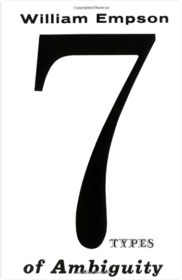 Ambiguity, according to Empson, includes "any verbal nuance, however slight, which gives room for alternative reactions to the same piece of language." From this definition, broad enough by his own admission sometimes to see "stretched absurdly far," he launches into a brilliant discussion, under seven classifications of differing complexity and depth, of such works, among others, as Shakespeare's plays and the poetry of Chaucer, Donne, Marvell, Pope, Wordsworth, Gerard Manley Hopkins, and T. S. Eliot. Fiction and the Figures of Life  (God Bless You, Dr. Kevorkian) By Vonnegut, Kurt, Jr. (Author) Paperback on 14-Dec-2010 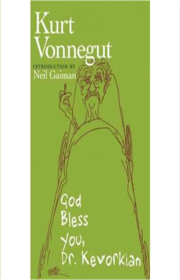 The Vonnegut Encyclopedia: Revised and updated edition 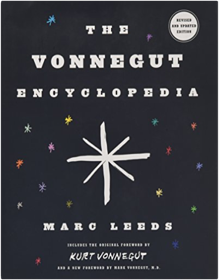 Over the course of five decades, Kurt Vonnegut created a complex and interconnected web of characters, settings, and concepts. The Vonnegut Encyclopedia is an exhaustive guide to this beloved author’s world, organized in a handy A-to-Z format. The first edition of this book covered Vonnegut’s work through 1991. This new and updated edition encompasses his writing through his death in 2007. Marc Leeds, co-founder and founding president of the Kurt Vonnegut Society and a longtime personal friend of the author’s, has devoted more than twenty-five years of his life to cataloging the Vonnegut cosmos—from the birthplace of Kilgore Trout (Vonnegut’s sci-fi writing alter ego) to the municipal landmarks of Midland City (the midwestern metropolis that is the setting for Vonnegut’s 1973 masterpiece Breakfast of Champions). The Vonnegut Encyclopedia identifies every major and minor Vonnegut character from Celia Aamons to Zog, as well as recurring images and relevant themes from all of Vonnegut’s works, including lesser-known gems like his revisionist libretto for Stravinsky’s opera L’Histoire du soldat and his 1980 children’s book Sun Moon Star. Leeds provides expert notes explaining the significance of many items, but relies primarily on extended quotations from Vonnegut himself. A work of impressive scholarship in an eminently browsable package, this encyclopedia reveals countless connections readers may never have thought of on their own. A rarity among authors of serious fiction, Kurt Vonnegut has always inspired something like obsession in his most dedicated fans. The Vonnegut Encyclopedia is an invaluable resource for readers wishing to revisit his fictional universe—and those about to explore it for the first time. Praise for The Vonnegut Encyclopedia “An essential collection for fans of the singular satirist.”—San Francisco Chronicle “Indispensable.”—Publishers Weekly “If you’re somebody who has read one Kurt Vonnegut book then there’s a chance you’ve read them all. For the devout reader of Vonnegut there’s a voracious sense of completism. And, Marc Leeds and his new [The Vonnegut] Encyclopedia are here to guide you through it all. Just don’t blame him if you become unstuck in time while you’re reading.”—Inverse “Vonnegut enthusiasts will be delighted with Leeds’s exhaustive, almost obsessive, treatment of the characters, places, events, and tantalizingly mysterious references for which Vonnegut’s five-decade writing career is celebrated. . . . A wonderful and beautifully designed reference source.”—Booklist (starred review) “Leeds’s scholarship and genuine love for his subject matter render this encyclopedia a treasure trove for Vonnegut readers.”—The Nameless Zine Player Piano 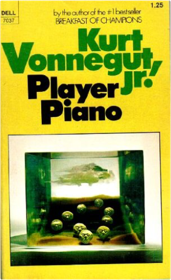 A Man without a Country 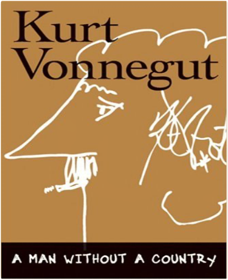 Armageddon in Retrospect  Cat's Cradle 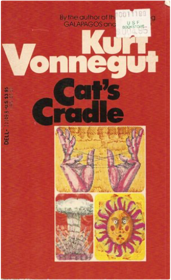 Complete Stories 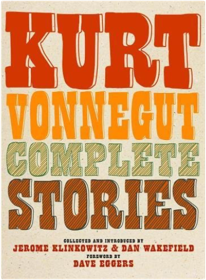 Selected and introduced by longtime Vonnegut friends and scholars Dan Wakefield and Jerome Klinkowitz, Complete Stories puts Vonnegut's great wit, humor, humanity, and artistry on full display. An extraordinary literary feast for new readers, Vonnegut fans, and scholars alike. Dead-eye Dick 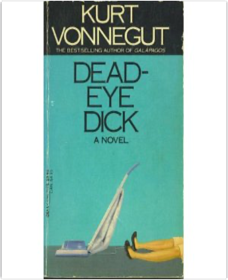 Fates Worse Than Death 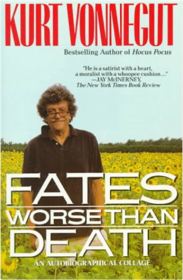 If This Isn't Nice, What Is?: Advice to the Young-The Graduation Speeches 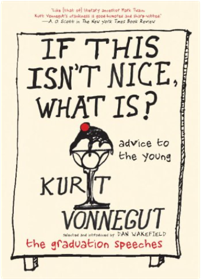 Selected and introduced by fellow novelist and friend Dan Wakefield, the speeches in If This Isn’t Nice, What Is? capture this side of Kurt Vonnegut for the first time in book form. There are nine speeches, seven given at colleges, one to the Indiana Civil Liberties Union, one on the occasion of Vonnegut receiving the Carl Sandburg Award. In each of these talks Vonnegut takes pains to find the few things worth saying and a conversational voice to say them in that isn’t heavy-handed or pretentious or glib, but funny and serious and joyful even if sometimes without seeming so. Jailbird 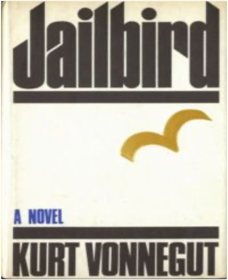 Kurt Vonnegut: Novels & Stories 1950-1962: Player Piano / The Sirens of Titan / Mother Night / Stories 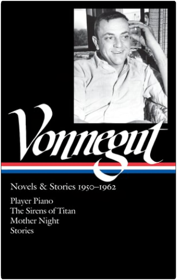 Kurt Vonnegut: Novels & Stories 1963-1973: Cat's Cradle / God Bless You, Mr. Rosewater / Slaughterhouse-Five / Breakfast of Champions / Stories 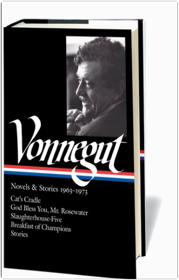 Capturing Vonnegut in pyrotechnic mid-career, this first volume of a projected three-volume edition gathers four of his most acclaimed novels. Cat's Cradle (1963) is a comedy of the end of the world (it ends with ice). God Bless You, Mr. Rosewater (1965) is the tale of a so-called fool, his money, and the lawyer who contrives to part them (it ends with fire). Slaughterhouse-Five (1969), Vonnegut's breakout book and one of the iconic masterpieces of twentieth-century American literature, is the tale of Billy Pilgrim, who, being unstuck in time, is doomed to continually relive both the firebombing of Dresden and his abduction by space aliens. And, in a text enhanced by the author's spirited line drawings, Breakfast of Champions (1973) describes the fateful meeting of "two lonesome, skinny, fairly old white men," one of whom disastrously believes that everyone else is a robot. The volume is rounded out with three brilliant short stories and revealing autobiographical accounts of the bombing of Dresden. Kurt Vonnegut: Novels 1976–1985 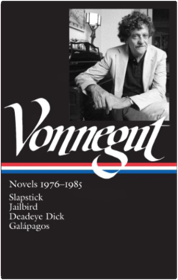 Kurt Vonnegut: Novels 1987-1997: Bluebeard / Hocus Pocus / Timequake: Library of America #273 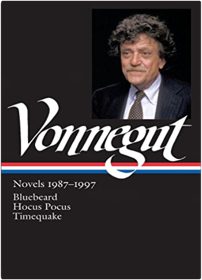 Kurt Vonnegut: The Last Interview: And Other Conversations 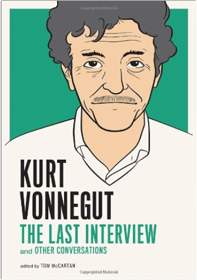 During his long career Kurt Vonnegut won international praise for his novels, plays, and essays. In this new anthology of conversations with Vonnegut—which collects interviews from throughout his career—we learn much about what drove Vonnegut to write and how he viewed his work at the end. From Kurt Vonnegut's Last Interview Is there another book in you, by chance? No. Look, I’m 84 years old. Writers of fiction have usually done their best work by the time they’re 45. Chess masters are through when they’re 35, and so are baseball players. There are plenty of other people writing. Let them do it. So what’s the old man’s game, then? My country is in ruins. So I’m a fish in a poisoned fishbowl. I’m mostly just heartsick about this. There should have been hope. This should have been a great country. But we are despised all over the world now. I was hoping to build a country and add to its literature. That’s why I served in World War II, and that’s why I wrote books. When someone reads one of your books, what would you like them to take from the experience? Well, I’d like the guy—or the girl, of course—to put the book down and think, “This is the greatest man who ever lived.” Like Shaking Hands with God: A Conversation about Writing 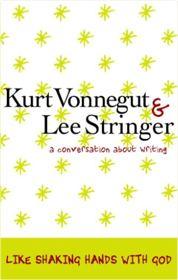 The setting was a bookstore in New York City, the date Thursday, October 1, 1998. Before a crowd of several hundred, Vonnegut and Stringer took up the challenge of writing books that would make a difference and the concomitant challenge of living from day to day. As Vonnegut said afterward, ""It was a magical evening."" A book for anyone interested in why the simple act of writing things down can be more important than the amount of memory in our computers. Look at the Birdie: Unpublished Short Fiction 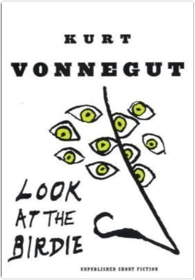 Here are tales both cautionary and hopeful, each brimming with Vonnegut's trademark humor and profound humanism. A family learns the downside of confiding their deepest secrets into a magical invention. A man finds himself in a Kafkaesque world of trouble after he runs afoul of the shady underworld boss who calls the shots in an upstate New York town. A quack psychiatrist turned "murder counselor" concocts a novel new outlet for his paranoid patients. While these stories reflect the anxieties of the postwar era that Vonnegut was so adept at capturing– and provide insight into the development of his early style–collectively, they have a timeless quality that makes them just as relevant today as when they were written. It's impossible to imagine any of these pieces flowing from the pen of another writer; each in its own way is unmistakably, quintessentially Vonnegut. Featuring a Foreword by author and longtime Vonnegut confidant Sidney Offit and illustrated with Vonnegut' s characteristically insouciant line drawings, Look at the Birdie is an unexpected gift for readers who thought his unique voice had been stilled forever–and serves as a terrific introduction to his short fiction for anyone who has yet to experience his genius. Read "Hello, Red" and "The Petrified Ants," two of the stories from the collection, as single-story e-books before Look at the Birdie goes on sale. Available wherever e-books are sold. Love, Kurt: The Vonnegut Love Letters, 1941-1945 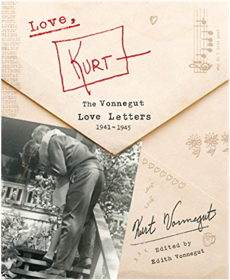 Mother Night 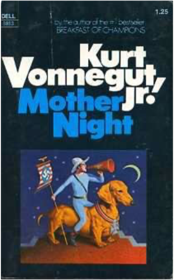 Palm Sunday 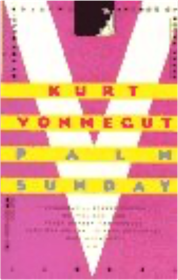 Pity the Reader: On Writing With Style 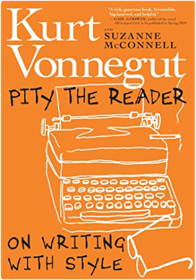 Here is an entirely new side of Kurt Vonnegut, Vonnegut as a teacher of writing. Of course he's given us glimpses before, with aphorisms and short essays and articles and in his speeches. But never before has an entire book been devoted to Kurt Vonnegut the teacher. Here is pretty much everything Vonnegut ever said or wrote having to do with the writing art and craft, altogether a healing, a nourishing expedition. McConnell has outfitted us for the journey, and in these 37 chapters covers the waterfront of how one American writer brought himself to the pinnacle of the writing art, and we can all benefit as a result. Kurt Vonnegut was one of the few grandmasters of American literature, whose novels continue to influence new generations about the ways in which our imaginations can help us to live. Few aspects of his contribution have not been plumbed—fourteen novels, collections of his speeches, his essays, his letters, his plays—so this fresh view of him, written by a former student, is a bonanza for writers and readers and Vonnegut fans everywhere. Sucker's Portfolio: A Collection of Previously Unpublished Writing  These stories trace trivial human lives and mundane desires, which is precisely where Vonnegut’s inimitable perspective as a humanist shines, illuminating his alternating hopeful and dismal outlook, although undoubtedly focusing on the latter. Here as in his greatest novels, Vonnegut’s writing takes us to the darkest corners of the human soul and with wit and humor, manages to remind us of our potential to be something greater. Episode List This book was initially released in episodes as a Kindle Serial. All episodes are now available for immediate download as a complete book. Learn more about Kindle Serials Timequake 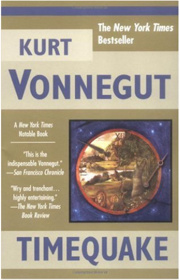 We Are What We Pretend To Be: The First and Last Works 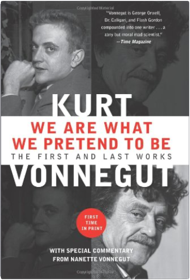 Written to be sold under the pseudonym of “Mark Harvey,” Basic Training was never published in Vonnegut’s lifetime. It appears to have been written in the late 1940s and is therefore Vonnegut’s first ever novella. It is a bitter, profoundly disenchanted story that satirizes the military, authoritarianism, gender relationships, parenthood and most of the assumed mid-century myths of the family. Haley Brandon, the adolescent protagonist, comes to the farm of his relative, the old crazy who insists upon being called The General, to learn to be a straight-shooting American. Haley’s only means of survival will lead him to unflagging defiance of the General’s deranged (but oh so American, oh so military) values. This story and its thirtyish author were no friends of the milieu to which the slick magazines’ advertisers were pitching their products. When Vonnegut passed away in 2007, he left his last novel unfinished. Entitled If God Were Alive Today, this last work is a brutal satire on societal ignorance and carefree denial of the world’s major problems. Protagonist Gil Berman is a middle-aged college lecturer and self-declared stand-up comedian who enjoys cracking jokes in front of a college audience while societal dependence on fossil fuels has led to the apocalypse. Described by Vonnegut as, “the stand-up comedian on Doomsday,” Gil is a character formed from Vonnegut’s own rich experiences living in a reality Vonnegut himself considered inevitable. Along with the two works of fiction, Vonnegut’s daughter, Nanette shares reminiscences about her father and commentary on these two works—both exclusive to this edition. In this fiction collection, published in print for the first time, exist Vonnegut’s grand themes: trust no one, trust nothing; and the only constants are absurdity and resignation, which themselves cannot protect us from the void but might divert. While Mortals Sleep: Unpublished Short Fiction 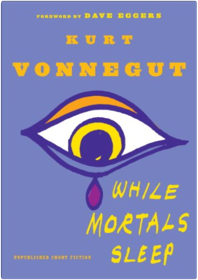 Smart, whimsical, and often scathing, the fiction of Kurt Vonnegut influenced a generation of American writers—including Dave Eggers, author of this volume’s Foreword. In these previously unpublished gems, Vonnegut’s originality infuses a unique landscape of factories, trailers, and bars—and characters who pit their dreams and fears against a cruel and sometimes comically indifferent world. Here are stories of men and machines, art and artifice, and how ideals of fortune, fame, and love take curious twists in ordinary lives. An ambitious builder of roads, commanding an army of bulldozers, graders, and asphalt spreaders, fritters away his free time with miniature trains—until the women in his life crash his fantasy land. Trapped in a stenography pool, a young dreamer receives a call from a robber on the run, who presents her with a strange proposition. A crusty newspaperman is forced onto a committee to judge Christmas displays—a job that leads him to a suspiciously ostentatious ex-con and then a miracle. A hog farmer’s widow receives cryptic, unsolicited letters from a man in Schenectady about “the indefinable sweet aches of the spirit.” But what will she find when she goes to meet him in the flesh? These beautifully rendered works are a testament to Vonnegut’s unique blend of observation and imagination. Like a present left behind by a departed loved one, While Mortals Sleep bestows upon us a shimmering Kurt Vonnegut gift: a poignant reflection of our world as it is and as it could be. Slapstick 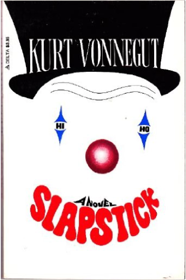 Wampeters Foma & Granfalloons 1ST Edition 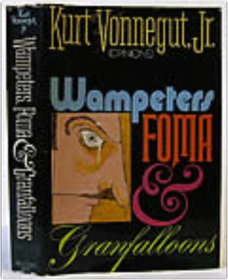 |


Delicious Library
Collection Total:
3,640 Items
3,640 Items
Last Updated:
Nov 2, 2025
Nov 2, 2025


 Made with Delicious Library
Made with Delicious Library